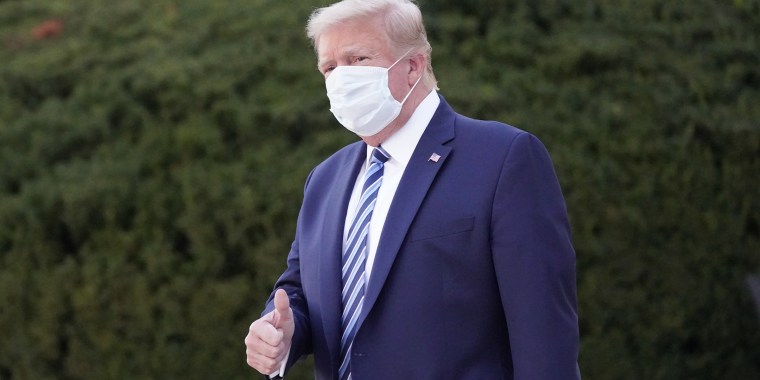Physicians responded with alarm to President Donald Trump's assertion on Twitter that COVID-19 is similar to the flu and that the United States is learning to live with it. The social media site later flagged the tweet with a warning.
"Comparing flu to COVID-19 is not only poor optics," Dr. Peter Chin-Hong, an infectious disease specialist at the University of California, San Francisco, said. "It's just morally reprehensible."
Full coverage of the coronavirus outbreak
Tuesday morning, Trump — who remains under a doctor's care for COVID-19 — tweeted: "Flu season is coming up! Many people every year, sometimes over 100,000, and despite the Vaccine, die from the Flu. Are we going to close down our Country? No, we have learned to live with it, just like we are learning to live with Covid, in most populations far less lethal!!!"
Within hours, Twitter flagged the tweet with a warning, saying it "violated the Twitter Rules about spreading misleading and potentially harmful information related to COVID-19." Facebook removed a similar post from the president.
The tweet appears to suggest the flu is deadlier than the coronavirus. The numbers clearly show the opposite: Last flu season, there were an estimated 38 million cases of the flu, including 400,000 hospitalizations and 22,000 deaths, according to the Centers for Disease Control and Prevention. So far this year for COVID-19, there have been 7.5 million cases and 211,000 deaths.
In fact, there have been more COVID-19 deaths in less than a year in the U.S. than the past five influenza seasons combined.
Dr. Michael Saag, associate dean for global health at the University of Alabama, Birmingham, said he is "horrified" at the death toll.
"That is not an acceptable outcome," Saag said. "That screams to me that I should be doing something about that."
"The notion of just learning to live with it is not an acceptable policy or strategy, in my opinion," he added.
Saag, a researcher and physician who has been treating patients with HIV/AIDS since the 1980s, said that there was "nothing worse" in his career than "taking care of a large number of people for whom we had no treatment."
"Instead of just throwing our hands up and saying, 'Oh well, it's just gonna kill some people,' we collectively — as a scientific community and as a society — worked to develop interventions that have resulted in the majority of people with HIV, living a near normal lifespan," Saag said.
Indeed, similar scientific pursuits have led to therapies and prevention options for the flu.
"We have strategies to treat flu. We have Tamiflu, which is great as an oral pill people can get in as an outpatient. We have vaccination," Chin-Hong said. "With Covid, we're in the middle of a raging epidemic."
Clinical trials for COVID-19 vaccines are still ongoing. The entire population remains largely at risk because there is no immunity to such a new virus.
Even though influenza viruses change from year to year, "there's still a lot of crossimmunity from prior influenza viruses, as well as the fact that millions of doses of flu vaccine are given every year," Dr. Priya Sampathkumar, an infectious disease and critical care specialist at the Mayo Clinic in Rochester, Minnesota, said.
"Even if the vaccine isn't a perfect match for the flu strain, it still does protect you. Ten years from now, Covid might be like the flu, when we have vaccines and the majority of the population is immune to it," she added.
For now, the only effective way to prevent the spread of the coronavirus, experts say, is through physical distancing, masks and hand-washing.
"We should be respectful of COVID-19," Chin-Hong said. "I'm always humbled by Covid, clinically. It's always teaching us something new."


